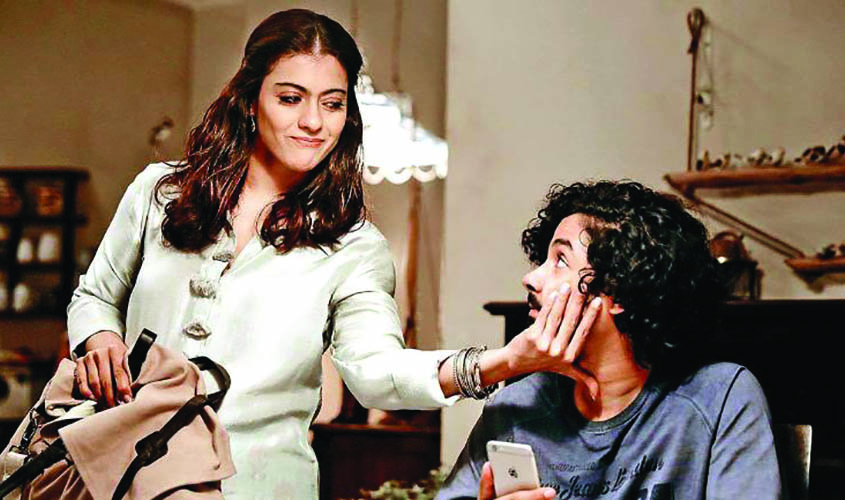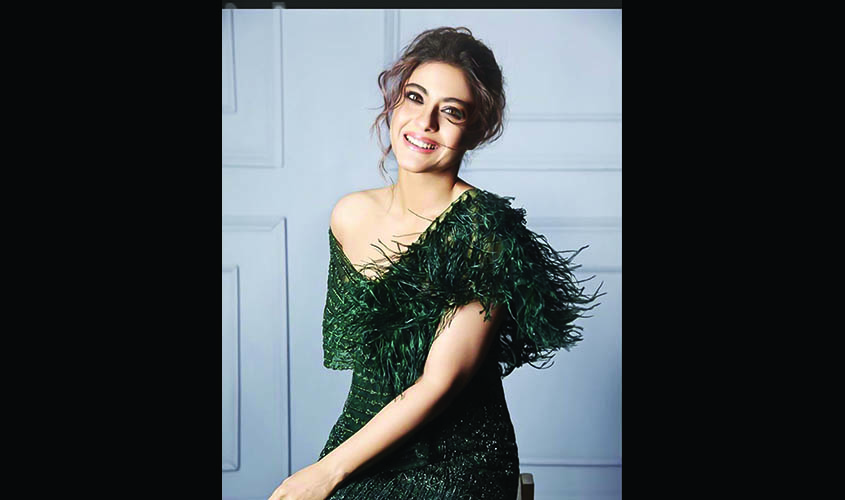There was a phase in the 1990s and early 2000s when almost every major Bollywood production featured Kajol as the female lead. But of late, her output has grown sparse and her approach as an actor has become more selective. She speaks to Bulbul Sharma about her latest film, Helicopter Eela, and about the impact online platforms have had on the entertainment industry.
Q. You were only 17 when you made your acting debut with Bekhudi in 1992. But since you come from a family that has had a long association with the film industry, do you think you had started to prepare yourself, maybe subconsciously, for the industry quite early in life?
A. Honestly, I never got that sort of learning from my family. I always looked at the film industry as my mother’s workplace. For example, my mother [Tanuja] would come home and talk about her friends. So I knew that they were all part of the film industry, but I had no clue that they were this famous. As far as my mother was concerned, it was always about, “Oh, I went to work”, and never about, “I gave this fabulous shot”. We never had that conversation… I only remember one film of hers very clearly: Haathi Mere Saathi. And I remember crying for three days and not talking to her because the elephant died in the end, and she was to blame for it. I was like, “The elephant died because of you!” And she was like, “It is not real.” I also said, “Who are these children calling you mom on the screen?” I just couldn’t get over that.
Q. What keeps you going as an actor?
A. I have done the work that I like and that’s the most important thing. I have done it because I felt like it, because I liked it. In fact, I have loved it. And I haven’t done any film for the sake of doing a film, and it has never been like, “Oh, I haven’t done a film in this year, so I should do one.” If I like anything I take it up.
Q. How has the Hindi film industry changed over the years in your experience?
A. The times have changed. I love the fact that we have different mediums now—there is Netflix, there is Amazon and then there are other digital platforms. I love the fact that everyone has a YouTube channel. You can do whatever you like and I love the fact that you don’t just need to act in films to be relevant. There was a period before social media, when if you did well you did phenomenally well, but if you failed you also failed phenomenally and on a phenomenally big stage. And you couldn’t even think about doing anything beyond that.
Q. So do you think the online space has also allowed actors more creative freedom?
A. Actors, actresses all have much more creative freedom now. There is a better playing field for each of them. Fabulous actors who were put to a side at one point of time are now getting huge appreciation and are doing a variety of roles. And this, I think is the greatness of the fact that we have so many mediums.

Q. Being one of the most successful actresses in the industry comes with a baggage of expectations—you’re supposed to carry yourself in a particular way or dress up a certain way. How do you cope with that?
A. A lot of people have criticised me because I have not carried that baggage and did not make my business to carry that baggage. I think it is necessary up to a point but I don’t think it is essential, and you must not think that your films are going to do better because of it. I think, as my daughter explained to me once, it has to do with brand-building. It has to do with your outward “movie persona” and what all you can do with it.
Q. Your latest release, Helicopter Eela, is a story that revolves around the subject of mother-son relationship. Since you are a mother in real life too, could you relate to Eela’s character when you were filming?
A. I am 30-40% Eela for sure. Eela is a little too much. She is over the top on another level. You are irritated by her as well, but you do forgive her for her little eccentricities. You are able to do so because a) She is not your mother, she is somebody else’s [laughs]; and b) Everything she does stems from love—if she is making her son’s dabba [lunchbox] that is because she loves him, if she is slapping him, that is because she loves him. Whatever she is doing, whether she is firing him, blackmailing him or anything else, it is all because of the fact that she really loves her son.
Q. Does Eela share any of her traits with your own real-life mother?
A. My mother is the complete opposite of Eela. The kind of upbringing she gave me is something I have treasured till today. I feel lucky that I am born to her. I tell her that I couldn’t have chosen a better mother because she was extremely brave in bringing me up. The kinds of things she taught me and told me as a kid—even though I used to feel frustrated at that time—I realise it only now the importance of those things. She taught me things like “Anger is not going to win”. And that if you let anger win, you let the other person win. And that you must act and not react. I am very grateful that my subconscious’ voice was Tanuja’s and that she taught me so many amazing things. And I am a better person because of that.
Q. Do you believe this film can help single mothers become better parents, and can serve as a reference point for them when it comes to dealing with societal expectations in general?
A. Helicopter Eela is not meant to be preachy. It is not meant to shove anything down your throat. It is about starting a conversation, about bringing your attention to this particular topic, not necessarily telling you what you should do. It will bring home the truth of a single parent, of women’s empowerment through a mother-son relationship, of teenage angst, of a woman wanting to find herself… In fact, the movie is not just about relationships, not just about the mother-son bond. It is about everybody, it is about issues that we all have.
Q. Do you think such an issue-based film would have done well at the box office in the ’90s?
A. I don’t know if it would have… But I am happy now that our audiences have changed so much and that’s because of social media. They have changed their viewpoint as far as films are concerned. Even we, within the film industry, have realised that we have to pull our socks up and do a better job because we can’t get away with chalta hai [“anything goes”] anymore. Everything is looked at with a microscope and examined carefully. You are being constantly compared to Hollywood and every other kind of international cinema. You have to realise that somewhere down the line, the kind of films we are making, with their subject matter and their look, the production—everything has to be on a much higher level than what it used to be 15-20 years back.

